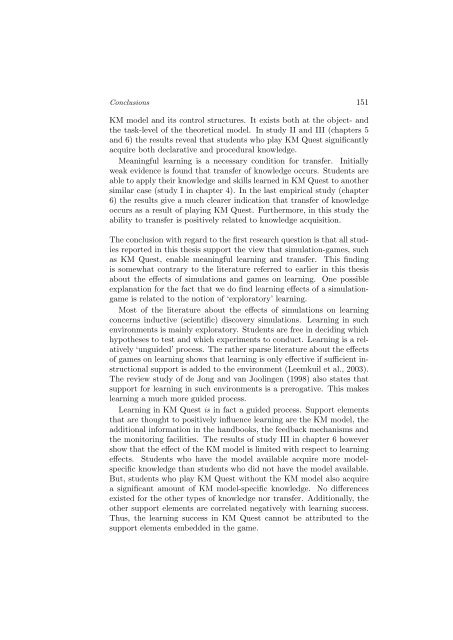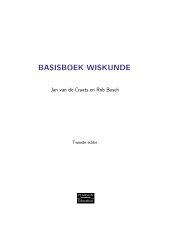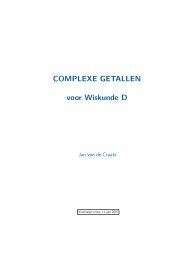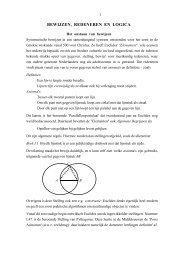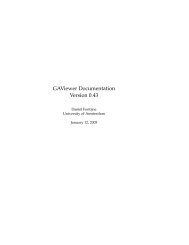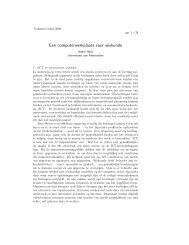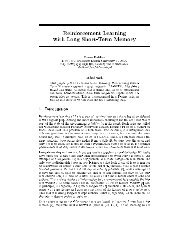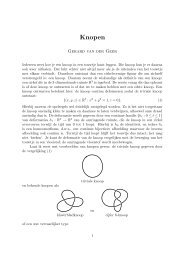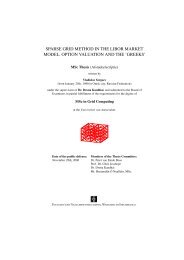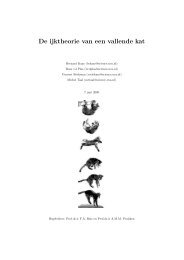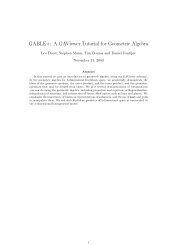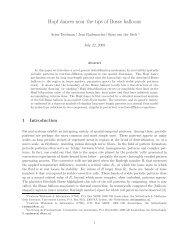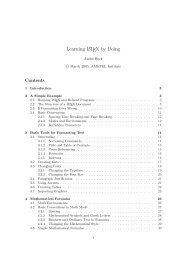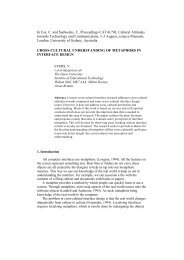The role of metacognitive skills in learning to solve problems
The role of metacognitive skills in learning to solve problems
The role of metacognitive skills in learning to solve problems
Create successful ePaper yourself
Turn your PDF publications into a flip-book with our unique Google optimized e-Paper software.
Conclusions 151<br />
KM model and its control structures. It exists both at the object- and<br />
the task-level <strong>of</strong> the theoretical model. In study II and III (chapters 5<br />
and 6) the results reveal that students who play KM Quest significantly<br />
acquire both declarative and procedural knowledge.<br />
Mean<strong>in</strong>gful learn<strong>in</strong>g is a necessary condition for transfer. Initially<br />
weak evidence is found that transfer <strong>of</strong> knowledge occurs. Students are<br />
able <strong>to</strong> apply their knowledge and <strong>skills</strong> learned <strong>in</strong> KM Quest <strong>to</strong> another<br />
similar case (study I <strong>in</strong> chapter 4). In the last empirical study (chapter<br />
6) the results give a much clearer <strong>in</strong>dication that transfer <strong>of</strong> knowledge<br />
occurs as a result <strong>of</strong> play<strong>in</strong>g KM Quest. Furthermore, <strong>in</strong> this study the<br />
ability <strong>to</strong> transfer is positively related <strong>to</strong> knowledge acquisition.<br />
<strong>The</strong> conclusion with regard <strong>to</strong> the first research question is that all studies<br />
reported <strong>in</strong> this thesis support the view that simulation-games, such<br />
as KM Quest, enable mean<strong>in</strong>gful learn<strong>in</strong>g and transfer. This f<strong>in</strong>d<strong>in</strong>g<br />
is somewhat contrary <strong>to</strong> the literature referred <strong>to</strong> earlier <strong>in</strong> this thesis<br />
about the effects <strong>of</strong> simulations and games on learn<strong>in</strong>g. One possible<br />
explanation for the fact that we do f<strong>in</strong>d learn<strong>in</strong>g effects <strong>of</strong> a simulationgame<br />
is related <strong>to</strong> the notion <strong>of</strong> ‘explora<strong>to</strong>ry’ learn<strong>in</strong>g.<br />
Most <strong>of</strong> the literature about the effects <strong>of</strong> simulations on learn<strong>in</strong>g<br />
concerns <strong>in</strong>ductive (scientific) discovery simulations. Learn<strong>in</strong>g <strong>in</strong> such<br />
environments is ma<strong>in</strong>ly explora<strong>to</strong>ry. Students are free <strong>in</strong> decid<strong>in</strong>g which<br />
hypotheses <strong>to</strong> test and which experiments <strong>to</strong> conduct. Learn<strong>in</strong>g is a relatively<br />
‘unguided’ process. <strong>The</strong> rather sparse literature about the effects<br />
<strong>of</strong> games on learn<strong>in</strong>g shows that learn<strong>in</strong>g is only effective if sufficient <strong>in</strong>structional<br />
support is added <strong>to</strong> the environment (Leemkuil et al., 2003).<br />
<strong>The</strong> review study <strong>of</strong> de Jong and van Jool<strong>in</strong>gen (1998) also states that<br />
support for learn<strong>in</strong>g <strong>in</strong> such environments is a prerogative. This makes<br />
learn<strong>in</strong>g a much more guided process.<br />
Learn<strong>in</strong>g <strong>in</strong> KM Quest is <strong>in</strong> fact a guided process. Support elements<br />
that are thought <strong>to</strong> positively <strong>in</strong>fluence learn<strong>in</strong>g are the KM model, the<br />
additional <strong>in</strong>formation <strong>in</strong> the handbooks, the feedback mechanisms and<br />
the moni<strong>to</strong>r<strong>in</strong>g facilities. <strong>The</strong> results <strong>of</strong> study III <strong>in</strong> chapter 6 however<br />
show that the effect <strong>of</strong> the KM model is limited with respect <strong>to</strong> learn<strong>in</strong>g<br />
effects. Students who have the model available acquire more modelspecific<br />
knowledge than students who did not have the model available.<br />
But, students who play KM Quest without the KM model also acquire<br />
a significant amount <strong>of</strong> KM model-specific knowledge. No differences<br />
existed for the other types <strong>of</strong> knowledge nor transfer. Additionally, the<br />
other support elements are correlated negatively with learn<strong>in</strong>g success.<br />
Thus, the learn<strong>in</strong>g success <strong>in</strong> KM Quest cannot be attributed <strong>to</strong> the<br />
support elements embedded <strong>in</strong> the game.


